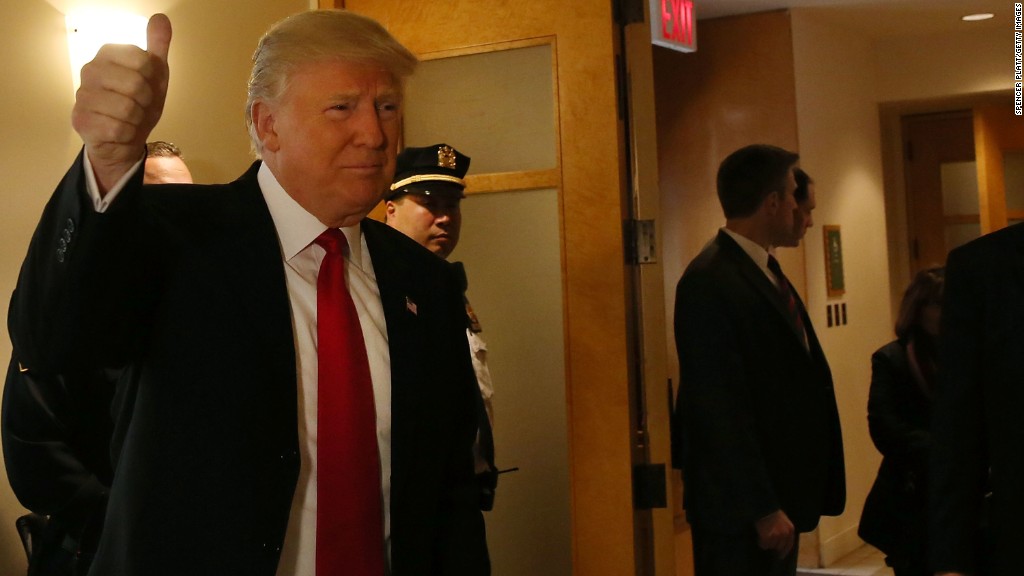
The next president of the United States will almost certainly be either Hillary Clinton or Donald Trump. The stock market reaction so far has been a shrug.
The Dow dropped about 50 points Wednesday morning, mostly for reasons other than the election.
"This extraordinary political volatility hasn't sunk in yet on Wall Street, which needs to come to grips with the fact that [any outcome] is quite negative," wrote Greg Valliere, chief strategist at Horizon Investments, in a note last week.
The two leading candidates for the White House have some anti-business plans. It's a mistake for investors to ignore these red flags, says Valliere.
Related: Americans' confidence in economy at 2016 low
Is the market ignoring red flags?
Clinton wants to raise taxes on investment gains and make it a lot more difficult for big businesses to move abroad to save on taxes. She's also talked about imposing a fee on big banks, among other stiffer regulations on Wall Street.
Trump likes to promote himself as the ultimate businessman, but many of his policies appear even more contrary to the traditional U.S. business agenda. He slams free trade and talks of hiking taxes on foreign imports and punishing companies that ship jobs overseas. He wants to deport millions of illegal immigrants and tighten border controls. On top of that, he regularly insults prominent American companies like Ford and Apple.
The best case scenario for investors
The best case scenario for business in Valliere's mind is a "modest Clinton win" where her zeal for more regulation would be kept in check by a Republican-led Congress.
But investors need to start thinking about a Clinton blowout -- with Democrats retaking control of the Senate too.
"Investors would have to contemplate the troika of Clinton, House Speaker Nacy Pelosi and Senate Majority Leader Chuck Schumer -- not a market-friendly scenario," says Valliere.
Then there's a scenario of a Trump win, which could cause an avalanche of uncertainty, something the market typically hates. His unpredictability may be winning votes, but it's a wild card for CEOs, especially ones trying to do business in China and elsewhere in the globe.
In polls so far, investors pick Clinton as the better choice for the markets, but there's a long way to November 8.
Related: Trump and Cruz predict stock market 'crash'
Will Trump and Clinton really do what they say?
Right now investors are a lot more concerned about what the Federal Reserve will do with interest rates this year (will the Fed actually raise them before Election Day?) and where oil prices are.
Investors like what they have been hearing from the Fed, which has helped send the Dow and S&P 500 back near their all-time record highs set about a year ago.
There's a belief on Wall Street that a President Clinton or President Trump would really tone it down once she or he is in the White House.
"Trump's going to be pro-business," says Kevin Kelly, chief investment officer of Recon Capital Partners. "He says things for effect, but you can see he's consistently rallied around business."
The rhetoric might be uglier than usual this year, but it's not new for candidates to promise or say one thing and do another once elected.
Hedge fund manager Carl Icahn, a vocal Trump supporter, has been making the case that Trump will "do what's needed for this economy."
Related: The cost of bringing home American jobs
Trade could take a hit
Either Trump and Clinton in the White House could mean the death knell for the major trade deals that the Obama administration is trying to finalize with Asia (the so-called Trans-Pacific Partnership that includes just about every nation in Asia but China) and Europe (the Transatlantic Trade and Investment Partnership).
Clinton once supported those deals. Now she's against them.
Trade and Wall Street have become major issues on the 2016 campaign trail. American voters have been clear where they stand: they don't like either.


